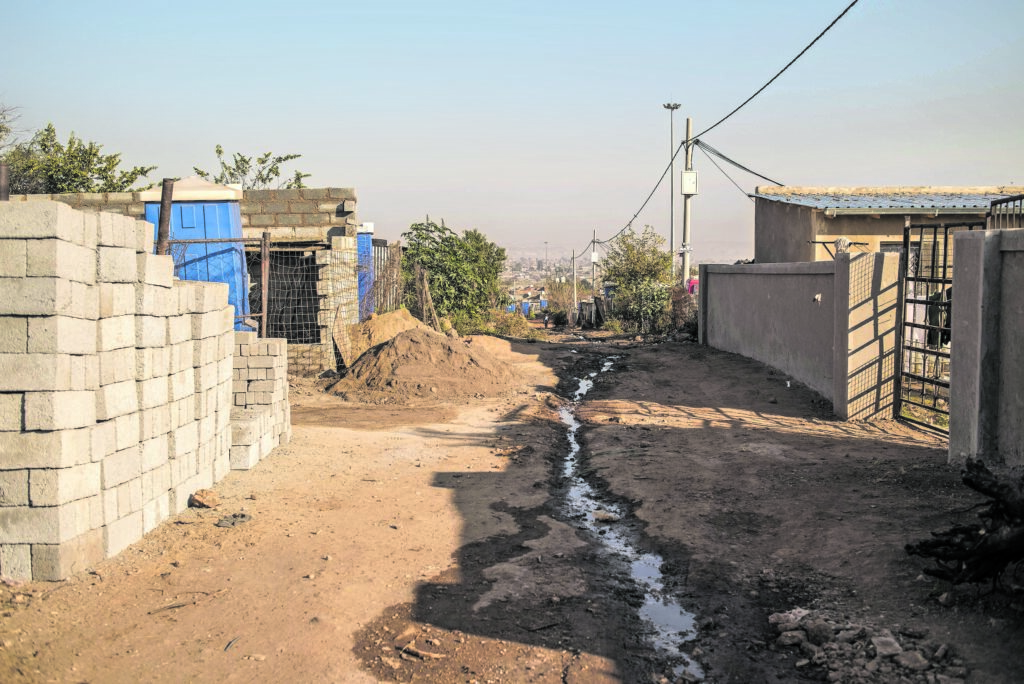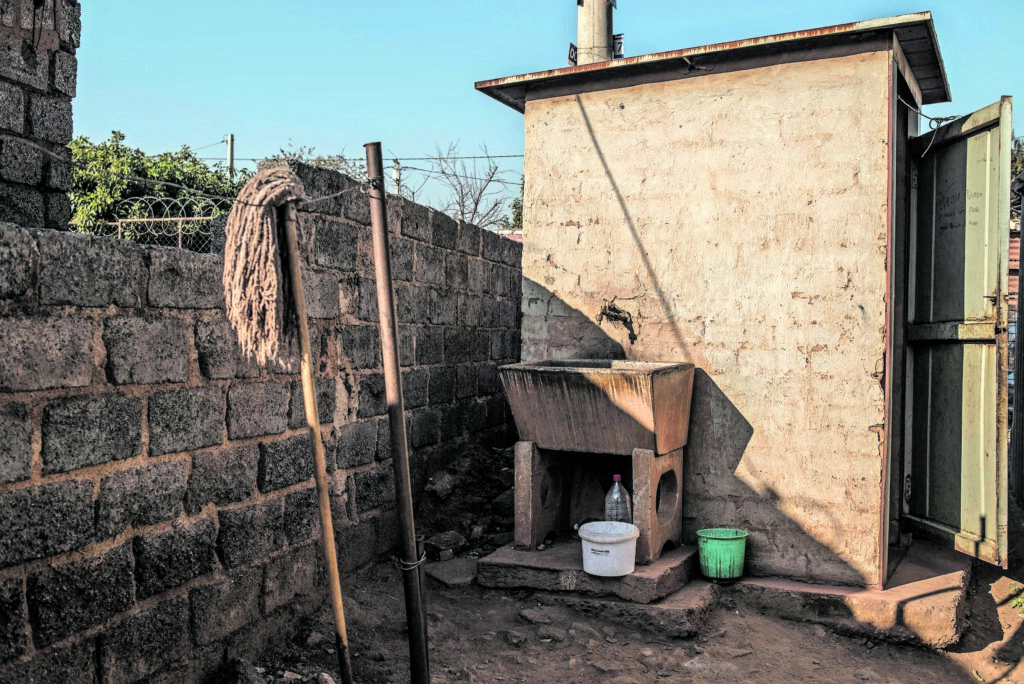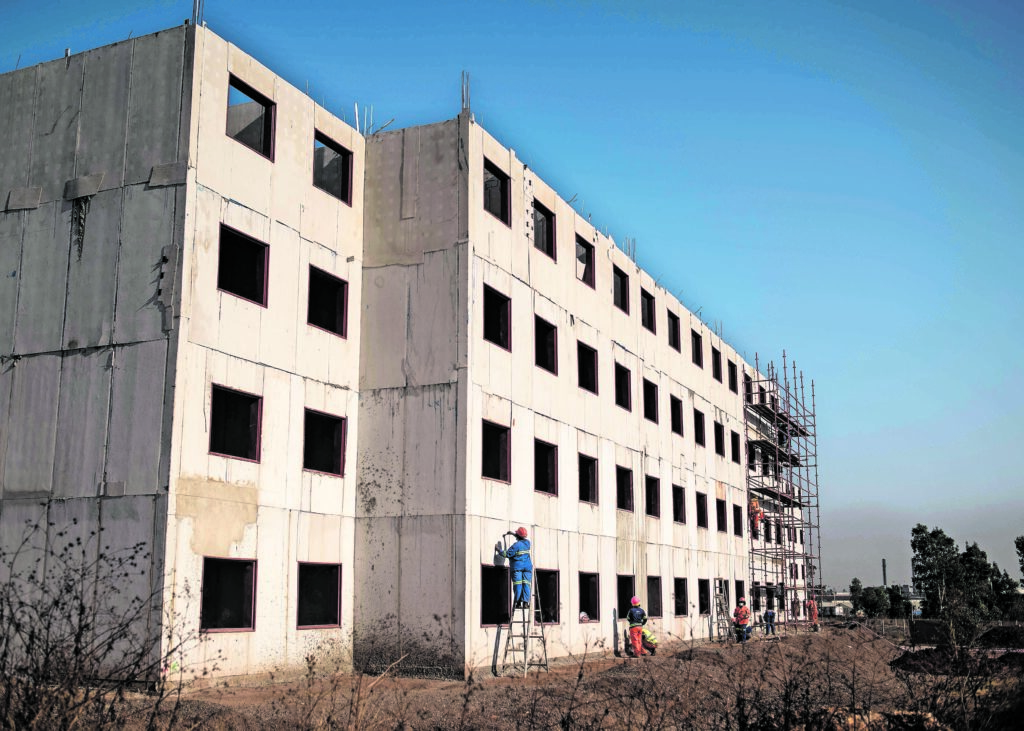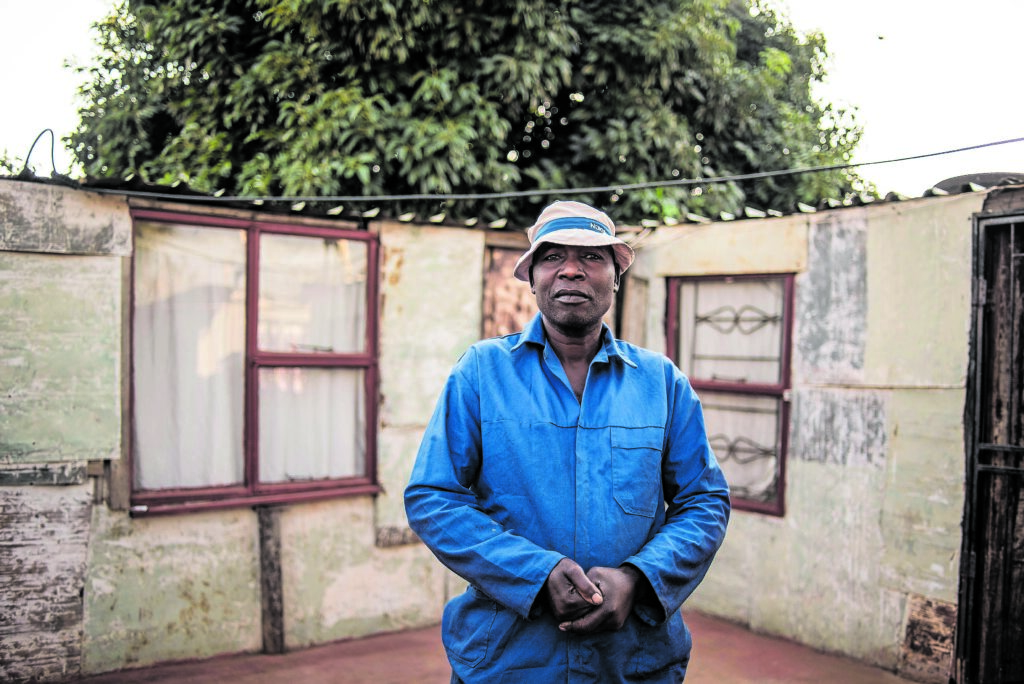Neighbours without homes: Zoliswa Mabena (above), Richard Maphaho and Somsy Matso are part of a community grouping in Ekurhuleni who
have taken their struggle for the RDP houses they were assigned but never received to the Constitutional Court.
Photos: Andy Mkosi
Zoliswa Mabena’s husband died last year. He had been waiting for a house for more than 25 years. But he, like more than 130 others, had not simply been waiting — they have been fighting the Ekurhuleni municipality in Gauteng for more than two decades by approaching former president Thabo Mbeki, then the Special Investigating Unit (SIU), the public protector and now they are appealing to the Constitutional Court for damages.
“It feels as though we are foreigners in another country. Living in this shack for so long with constant promises we will get our houses is hard. My children were born here, and now they are grown and looking for work. Look at this place we call home. This is not how humans are meant to live. But they don’t care. All they care about is us voting for them,” said Mabena.
Standing in her 4.5m x 3m section of the yard in the Winnie Mandela informal settlement, wrapped in a blue towel, the 45-year-old’s face is taut as she points to her makeshift home. Some parts are made of wood, others are corrugated iron, and one wall is made of cement blocks in parts held together by wires. In between the miasma of materials, gaping holes give you sight into a dimly lit kitchen. It’s dark inside the shack Mabena calls home in Tembisa.
“There’s one room here and another right opposite it. My children and my grandchildren live here with me. Men, women, boys and girls all in this small space. It’s not right. And now, because the municipality made a mess of this whole process, another family has forcefully built in the same yard. Here one day, someone will die fighting for these small bits of land.”
Mabena refers to how the municipality allocated the piece of land they had built on in 1994 to other people because Mabena and her community were meant to be housed elsewhere. Houses for Mabena and 133 others never materialised. Now some of them have to share a 9m x 6m yeard with one or two other families, causing tensions to rise even further.
Through hundreds of pages of court records, the story is the same.
For more than 25 years, the residents have been living in shacks made of wood, corrugated iron and plastic without running water, electricity and basic sanitation — apart from rudimentary pit toilets. They must fetch water from communal taps.
 No services: The group of angry residents n the Winnie Mandela informal settlement in Tembisa say even the toilets they were allocated were given to other beneficiaries.
No services: The group of angry residents n the Winnie Mandela informal settlement in Tembisa say even the toilets they were allocated were given to other beneficiaries.
In 1998 the residents were placed on the housing waiting list for RDP houses. In 2000 these residents’ subsidy applications were approved. In terms of the subsidy, the residents would be entitled to a service stand on which a house would then be built. Their subsidies were paid to the municipality, which engaged and paid a developer to construct RDP houses for each resident.
However, the residents were not given the houses. Instead, the Tshwane high court found these houses were given to people known to Mabena and the others in her community.
“Many of the residents have also been registered as owner and municipal account holders of these misallocated stands, with the result that they are billed every month for services they do not consume on a property they do not own. The residents claim that the municipality corruptly allowed other people to occupy their houses. These people were not entitled to the houses, and they had not placed themselves on the housing list,” reads the court document.
These court records dated July 2020 form part of the long-standing battle between the residents and Ekurhuleni municipality, the executive mayor, the city manager and the head of the human settlements department in the municipality.
However, this is not the first time this issue has raised its head. In 2005, after houses were still allegedly misallocated — in trying to find answers — the community established an organisation now called the Ekurhuleni Concerned Residents Association.
According to one of the current members, Somsy Matso, after the organisation could not get any answers about the allegations, at the time, that their houses had been sold to people who had not been on the list, they wrote a letter to the then-president Thabo Mbeki.
He signed an SIU proclamation requesting an investigation into the alleged double allocation of houses and the selling of stands to non-qualified beneficiaries by corrupt Ekurhuleni municipality officials and ward councillors.
Matso said that the report they received had parts missing and had not been signed.
 Somsy Matso is a member of the Ekurhuleni Concerned Residents Association.
Somsy Matso is a member of the Ekurhuleni Concerned Residents Association.
The report, dated 2006, stated that there is evidence that the current occupants of the RDP houses are not entitled to occupy these houses and that the procedure followed was incorrect.
“All of the alleged beneficiaries indicated in the spreadsheets applied for subsidies which were approved during the year 2000,” reads the report.
All it recommended was that the municipality must rectify and address the situation as soon as possible.
Fifteen years later, one of the beneficiaries, William Marakalala, says he is still waiting.
“We have been promised for decades. Voting for the ANC since then and we have nothing for ourselves. We benefit nothing. I have been working until I have been retrenched, and I still live in a shack.
“At this point, all I am asking for is a toilet now — just sanitation. There is nowhere for me to go. There is no space left for any of us. People are fighting for space.”
The 60-year-old points to his son, who is sitting on a red stoep, the only cement material surrounding the shack, eating porridge. He is the last-born of Marakalala’s children. He was born in this settlement. His older sisters have left home already after building their own lives with their families.
“I have washed my hands of this party. Enough is enough. But they keep saying, ‘We are going to move you, we will.’ But each and every year, it is a song. We are just dancing to that song now like we’re in a circus.”
 No services: The group of angry residents n the Winnie Mandela informal settlement in Tembisa say even the toilets they were allocated were given to other beneficiaries.
No services: The group of angry residents n the Winnie Mandela informal settlement in Tembisa say even the toilets they were allocated were given to other beneficiaries.
Marakalala says the municipality wants to move them to flats, but there are too many people who want access to the flats, situated just behind the Tembisa Hospital.
“They promise everyone. This is a duck-and-dive situation that has no end. Speaking to the councillor here is like speaking to a deaf person. It goes in one ear, he makes promises and then it goes out the other.”
In 2017 Judge Mmonoa Teffo ordered that the municipality provide the residents with a house in Tembisa extension 25 or any other agreed location before 31 December 2018 and register the residents as titleholders by the December of the following year.
 A construction site of a block of flats being built for Winnie Mandela residents in Tembisa.
A construction site of a block of flats being built for Winnie Mandela residents in Tembisa.
“It is clear on the papers that the respondents have not indicated with certainty when the houses or stands can be allocated to the applicants. The applicants have waited long enough … the delay in providing the applicants with access to adequate housing cannot recur forever,” said Teffo.
But this did not happen, and further court action had to be taken.
In a judgment from last July, Judge Annali Basson states that the municipality accepts its constitutional obligation to provide housing for the residents. Their point of contention now is when these houses should be delivered.
“The municipality further seeks a declaratory order to the effect that the residents accept so-called walk-up houses that will be constructed in Tembisa. In these proceedings, the municipality, although accepting that it submitted a timetable to the SCA [Supreme Court of Appeal] that demonstrated that the residents would be provided with complete houses by 30 June 2019, now submits that the municipality did not foresee the delays in this matter,” reads Basson’s judgment.
The municipality brought forward various reasons why they could not deliver the houses, including work stoppages due to disturbances by business forums and community members.
“The residents opposed this application and launched a counter-application seeking constitutional damages to compensate for the period after 30 June 2019 during which they were not given the houses to which they are entitled.”
The records show that the municipality missed the deadlines given to it by the SCA. Citing delays by the municipality and its failure to respond to letters from the Socio-Economic Rights Institute of South Africa and the lawyers acting for the Ekurhuleni Residents Association, Basson said that she agreed with the residents that the municipality has failed or refuses to acknowledge its obligation in terms of the court order.
“These measures set out in the court order are not confined simply to fitting these residents into the Tembisa Extension 25 Project. It is simply not acceptable to lump the resident together with the more than 3 500 other recipients … the plight of every South African who is desperately waiting for a house is recognised; [but] these individual residents are in a category of their own. They are the beneficiaries of a court order entitling them to houses on or before 30 June 2019,” reads Basson’s ruling.
Though first applied for and dismissed by Basson, the issue of constitutional damages is now before the Constitutional Court.
Each of the residents is claiming R5 000 a month for every month of delay beyond 30 June 2019. The municipality argued that such damages are not the appropriate relief as the courts have already vindicated the residents’ rights, and the relief would only punish the municipality.
In February, the Constitutional Court heard both sides and reserved judgment.
However, while the community awaits whether there will be finality to the 25-year saga, residents such as Richard Maphaho still believe there is some fight left.
 Richard Mphapho is a resident of Winnie Mandela in Tembisa. He has been waiting for a house since 1994.
Richard Mphapho is a resident of Winnie Mandela in Tembisa. He has been waiting for a house since 1994.
“There is very little else we can do. My kids were born here, and we might die here, but those houses were ours, and we can only continue the fight.”
His neighbour, Matso, says they are waiting for the Constitutional Court ruling because even if they tried to put their names on the lists anywhere else in the country, their applications are not accepted.
“We have sent people to other provinces to try to get on the lists. They can’t because their details show they have already been allocated a house here in Tembisa. We are still living in shacks. The municipality has failed us so many times and has failed to heed the rulings of the courts to give us our houses. If the courts can’t make them do it, we have to find another way to ensure there is the impetus for them to give us houses,” said Matso.
Walking down the dusty street towards his house and skipping over furrows of dirty water, he points to all the residents who were once part of the fight.
“There are more than 1 000 people who were made these promises. Some have died, and others have given up, and that is why we are down to 133. But we will keep fighting for these houses. They mean so much more than just a roof over your head it is connected to their dignity. We can’t stop fighting.”
This article was possible due to the support of the German federal foreign office and the Institut für Auslandsbeziehungen (IFA) Zivik funding programme. The views presented here do not necessarily represent the views of the German federal foreign office or the IFA